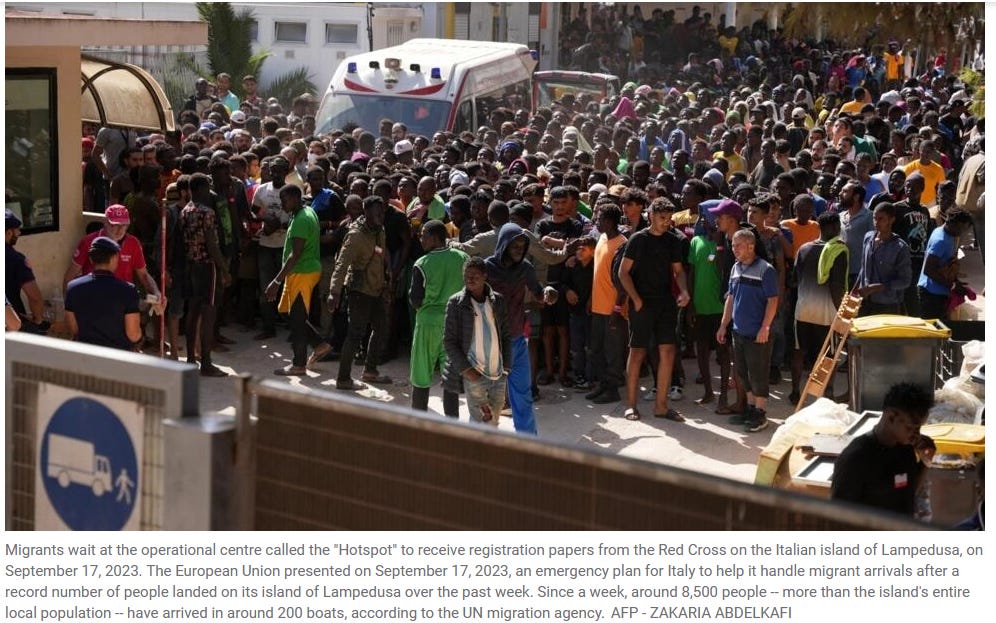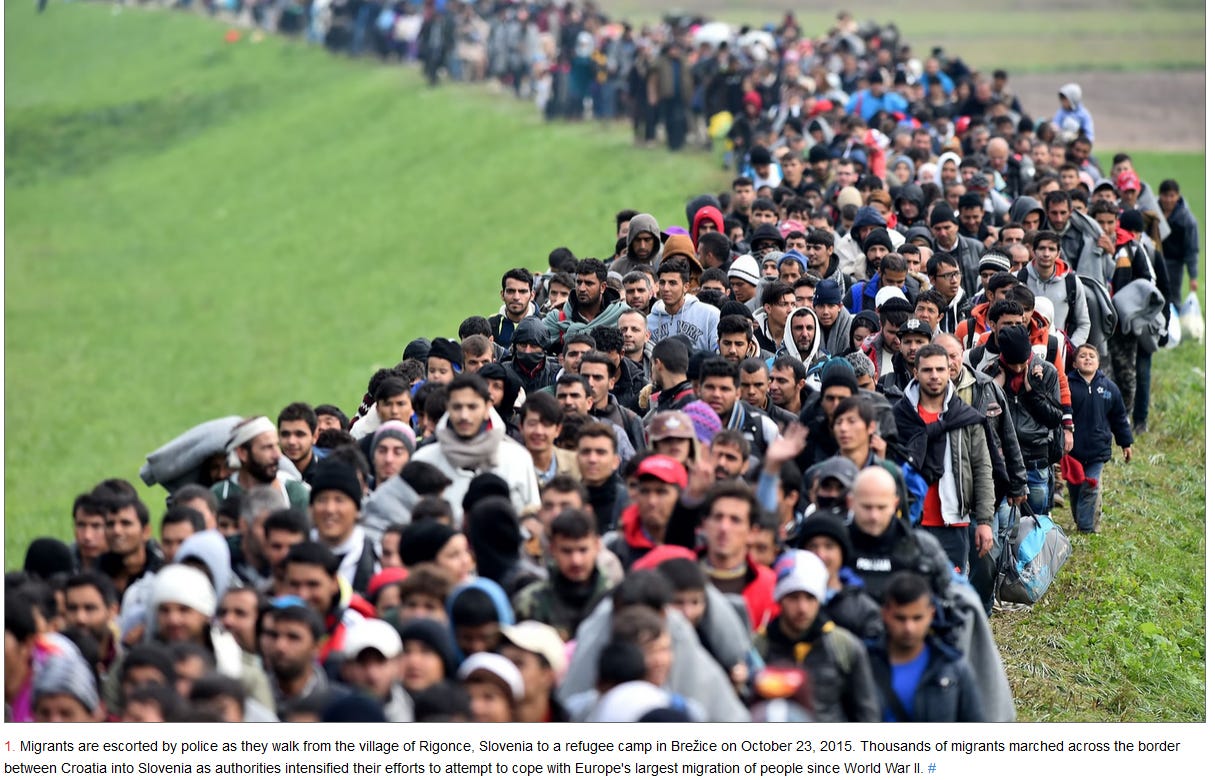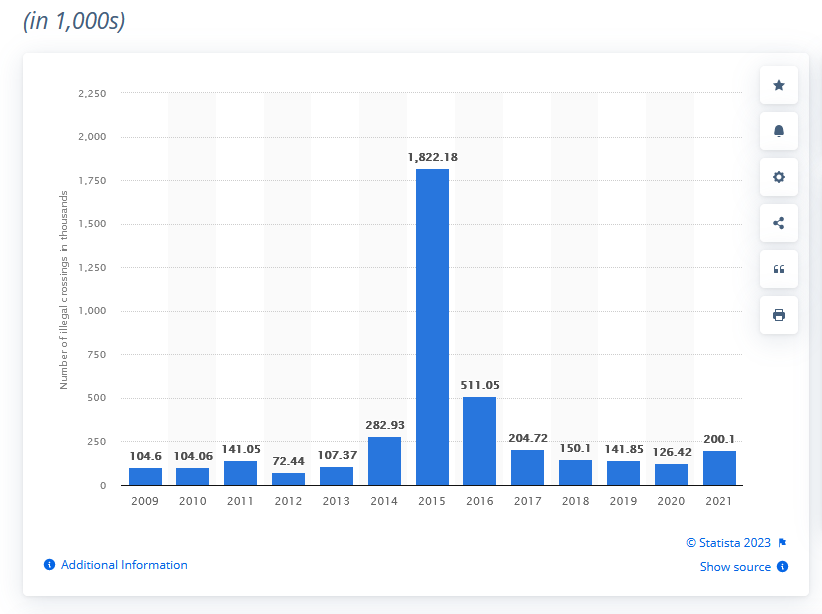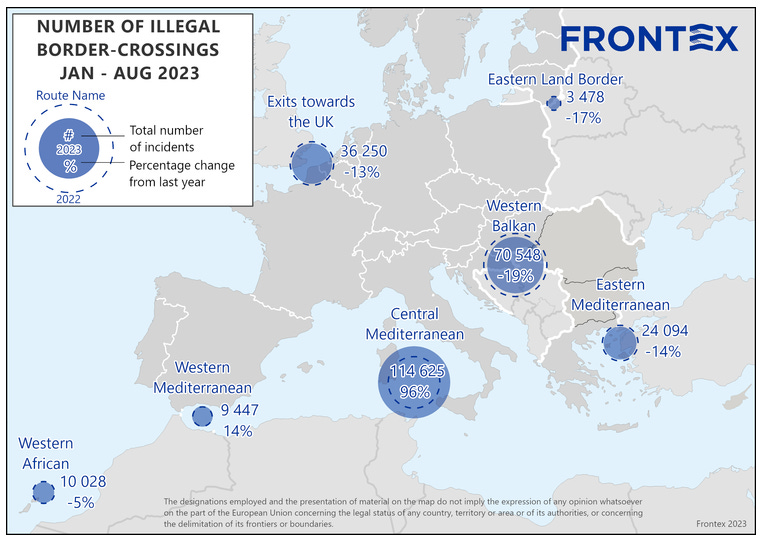A little over a month ago, my parents and I were heading up from Split on the coast to the capital of Zagreb to attend my cousin Marija’s wedding. As usual, I decided to veer off of the highway at some point during the journey north, in order to take some country roads so that we could enjoy the pleasant scenery.
We passed through the tiny region of Kordun at some time around 2pm that day. The road we were on ran parallel to the border with Bosnia-Herzegovina, which was some 5-10km to the east of us. We spotted a column of six men walking alongside the road, heading north, just before we entered Rakovica. Both my parents said ‘migrants’ at the exact same time, even before I could open my mouth to say the same thing. These young men were from either Afghanistan or Pakistan. What made this encounter with migrants stand out is that it was daytime, and they were using a road that sees a fair bit of traffic. To be blunt: they were brazen in their presence, whether intentionally or not.
The Republic of Croatia has stationed 6,000 police officers in and around the border with Bosnia-Herzegovina to prevent migrants illegally crossing into the Schengen Zone. Despite this, many are still getting through, especially via Northwestern Bosnia, where the terrain is mountainous, the region sparsely-populated, and the trails many. The presence of migrant camps in the area around Bihac and Velika Kladusa in Bosnia’s northwest ensures that multiple attempts are made daily to cross over into Croatia from the Bosnian side. Croatian police are playing a game of whack-a-mole, with the added pressure of collusion between migrant-friendly, human traffickers aka NGOs, and their allies in western media who accuse these same policemen and women of “brutality”.
Croatia is now erecting a migrant collection centre near the city of Karlovac, the narrow part of the country lying between Bosnia and Slovenia. Karlovac (aka Karlstadt, or Charleston in English) was a purposely built Habsburg fortification town that served as a rampart to prevent the Ottomans from entering Central Europe. The symbolism of erecting a building in the wake of another invasion from outside of Europe cannot be denied, even if these incursions do not resemble one another in form. Even though the numbers of crossing attempts are skyrocketing, Croatia still has control over its own borders, unlike Italy.
Last week, Italy’s southernmost island, Lampedusa (pop. 6,000), saw 10,000 migrants wash ashore, with 7,000 of those arriving in a single 48 hour span thanks to a flotilla that numbered well over 100 ships and boats in total. The island is overwhelmed and the locals are revolting against Premier Giorgia Meloni’s impotence. Meloni, whose party was catapulted into power due to popular resentment against both the continuation of mass migration to Italy and the strict COVID-19 regime, has effectively abdicated her role to protect Italy’s borders, resulting in her being criticized by France’s Marine Le Pen, describing her behaviour as “cowardice”. Making matters worse, thousands of migrants on the island broke out the asylum centre and raised roadblocks to “demand immediate transfer to the European mainland”. Italy has lot control over its own borders, with Meloni pleading to Brussels to step in and help control the flow of migrants:
Italian leader Giorgia Meloni has demanded Brussels step up to help her country deal with a surge in migrants.
The country's prime minister said it was not a question of "solidarity" but the European Union's "responsibility" to assist - after more than 11,000 people arrived on Italy's southernmost island of Lampedusa in less than a week, overwhelming the authorities and sparking protests by residents.
She even went as far as calling for a naval blockade of North Africa:
She told them the government was working on a robust response, including a €50m (£43m) to help the island, but a heckler in the crowd said it was not just money needed.
In the face of the current emergency, Ms Meloni has pledged tougher measures and renewed calls for a naval blockade of North Africa to stop the boats from getting through - after a newborn baby was found dead on a migrant boat.
Speaking at a news conference, she said: "I would like to repeat that I do not consider this a gesture of solidarity of Europe towards Italy, I consider it instead a gesture of responsibility of Europe towards itself because these are the borders of Italy but they are also the borders of Europe."
Ms Meloni added: "If someone in Europe thinks that facing the global crisis that we are facing, the question could simply be resolved by closing it inside the Italian borders, they would clearly be blind."
A state that has lost control over its own borders is not a state with absolute sovereignty over its own territory, whether it is Italy or Ukraine. The Italian case cannot be equated to the ongoing flood of migrants across the Rio Grande between Mexico and the United States of America, as the latter’s national government is purposely permitting these arrivals.
I do not blame these migrants for seeking a better life in Europe. People have always gone where they feel it is better for them to live and work (even if many of these migrants already in Europe have no desire for employment, and are content living on the dole). The generous social schemes in many European countries attracts migrants like a magnet, and their journey is facilitated by human smugglers, whether the traditional ‘criminal’ type, or the whitewashed ones who label themselves “NGOs operating rescue missions”. The problem in Europe lies solely with its cowardly political leadership, with bad actors for whom the concept of 'nation’ is an anathema, with craven business owners and lobbyists seeking to maximize profits through wage competition, with their respective judiciaries, and with the international treaties that these countries have signed that force open their doors to this deluge.
Despite the growing flood of arrivals from Asia and Africa, and despite their hands being tied by legally-binding covenants to protect the “human rights” of these invaders, Europe has the ability to stem this tide and shut the spigot off. It has been done before. All that is lacking is THE WILL.
Silvio Berlusconi had the will to do so, and managed to strike a deal with Libya’s Muammar Gaddafi to shut down the Libya-to-Italy route for human trafficking. Please note the outrage from this 2009 article by Human Rights Watch, a Soros-funded organization:
Libyan leader Mu`ammar al-Gaddafi will visit Italy on June 10, 2009 to celebrate the ratification of an Italy-Libya Friendship Treaty that has already resulted in joint naval patrols that run roughshod over refugee and migrant rights, Human Rights Watch said today.
"Prime Minister Silvio Berlusconi and Mu`ammar al-Gaddafi are building their friendship agreement at the expense of people from other countries whom both regard as expendable," said Bill Frelick, refugee policy director at Human Rights Watch. "It looks less like friendship and more like a dirty deal to enable Italy to dump migrants and asylum seekers on Libya and evade its obligations."
How dare a country refuse to turn itself into an open-air migrant processing centre courtesy of human traffickers? Is it any wonder that both Berlusconi and Gaddafi were removed from office by foreign powers not too long after this deal was announced?
Elite Arrogance and Paranoia
A straight line can be drawn from Angela Merkel’s invitation to Syrian migrants to settle in Germany through to the victory of the pro-#Brexit side in the UK’s referendum on whether to leave the European Union. The images of long columns of young men snaking their way through Europe toward Germany managed to tip the balance in the UK, leading many to conclude that the #Brexit Referendum was really a referendum about migration, something that has been denied to all Europeans (with the notable exception of Poland, where Poles this month will have their say on the matter) for fear of inevitable public rejection of more migration.
#Brexit has since been categorized as a “populist moment”, and with good reason. Alongside this shock result came the surge of populism on the European continent, with populist parties now a permanent feature of national and European politics. The 2008 Financial Crisis certainly did play a role in the rise of the non-mainstream parties that are grouped together under the “populist” umbrella, but it was the significant spike in migration a few years later that gave them the wind in their sails, allowing them to reach a critical mass of support that ensured their continuing existence.
Elites being elites did not seem to learn the lesson that the people can and will revolt, and instead insisted that it the people were “tricked”, primarily by “disinformation” courtesy of bad actors using the internet to destabilize their countries and play upon the misguided fears of voters. The UK Tory co-opting of and watering-down of #Brexit gave these elites hope that the populist backlash could be squelched. The removal of Donald Trump from power restored their confidence in the system that made them the ruling elites. The COVID-19 interregnum allowed them to use state power to regroup and attack all non-mainstream parties as “conspiracy theorists” and “extremists” to one extent or another, as they passed bills to clamp down on the internet, while working with Big Tech to censor what they could not legally censor. The elites could now get back to work, with re-opening the migrant spigot a central feature of their collective project.
The official number of irregular border crossings into Europe began to decline after ‘Merkel’s Folly’ led to the significant populist backlash that followed from it. COVID-19 saw a respite, but the numbers began to climb up once again in 2021.
2022 saw the official number of irregular border crossings jump to 330,000, a figure not seen since 2016. 2023 is on pace to see even more irregular border crossings than 2022:
It’s important to stress that these are only the official numbers, meaning that we do not know how many manage to get through every year and disappear into the continent.
One of the most interesting aspects of this migrant resurgence is that the ruling elites know full well that they are playing with political fire. They know that they are inviting another populist backlash. The EU’s Senior Diplomat, Josep Borrell, stated last week that migration could be a “dissolving force for the European Union” due to deep cultural differences between various member states. There is a sleight of hand in his statement, in that it assumes popular support for migration in the countries of Western Europe, a view that has never been put to the test in a proper referendum. When Borrell speaks of “cultural differences” between member states, he only refers to their ruling governments and totally excludes the actual voters themselves.





